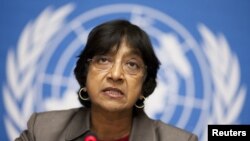As President Barack Obama has said, Iran has a celebrated culture and history: "Over many centuries your art, your music, literature and innovation have made the world a better and more beautiful place. . . . We know that you are a great civilization, and your accomplishments have earned the respect of the United States and the world."
But recent reports from Iran about the actions of the Iranian government stand in sharp contrast to Iran's great history and culture. The Iranian government has executed more than 66 people so far this year, three times the rate of executions for the same period last year. U.N. High Commissioner for Human Rights, Navi Pillay expressed alarm over the number of those executed, including three known to be political dissidents. "Dissent is not a crime," she said. "It is absolutely unacceptable for individuals to be imprisoned for association with opposition groups, let alone be executed for their political views or affiliations."
Meanwhile, the start of the year has brought no end to the harsh sentences the government is imposing on human rights defenders.
Navid Khanjani, a member of the Human Rights Reporters Committee, was recently given a 12 year prison term for his journalistic activities and efforts in defense of the right to education in Iran. Mr. Khanjani, who is a member of the Baha’i community, had been barred from university studies because of his religion. There are credible reports that during interrogations he was tortured.
Journalist and human rights activist Kaveh Ghassemi was sentenced to five years in prison. A member of the Kurdistan Human Rights Organization and the One Million Signatures Campaign devoted to ending gender discrimination in Iran, he was convicted of the so-called crime of "propaganda against the regime."
Sarah Leah Whitson, Middle East director at Human Rights Watch, said recently, "The noose has tightened, in some cases literally, around the necks of activists in Iran. The government crackdown . . . .is now a broad-based campaign to neutralized Iran’s vibrant civil society."
State Department spokesman P.J. Crowley said in a statement, "The United States is deeply concerned that Iran continues to deny its citizens their human rights. Judicial cases, trials and sentences continue to proceed without transparency and the due process rights enshrined in Iran’s own constitution. . . .The United States urges the Iranian government. . . .to guarantee the rights of its citizens in accordance with its international obligations."
The Iranian government has executed more than 66 people so far this year, three times the rate of executions for the same period last year.




